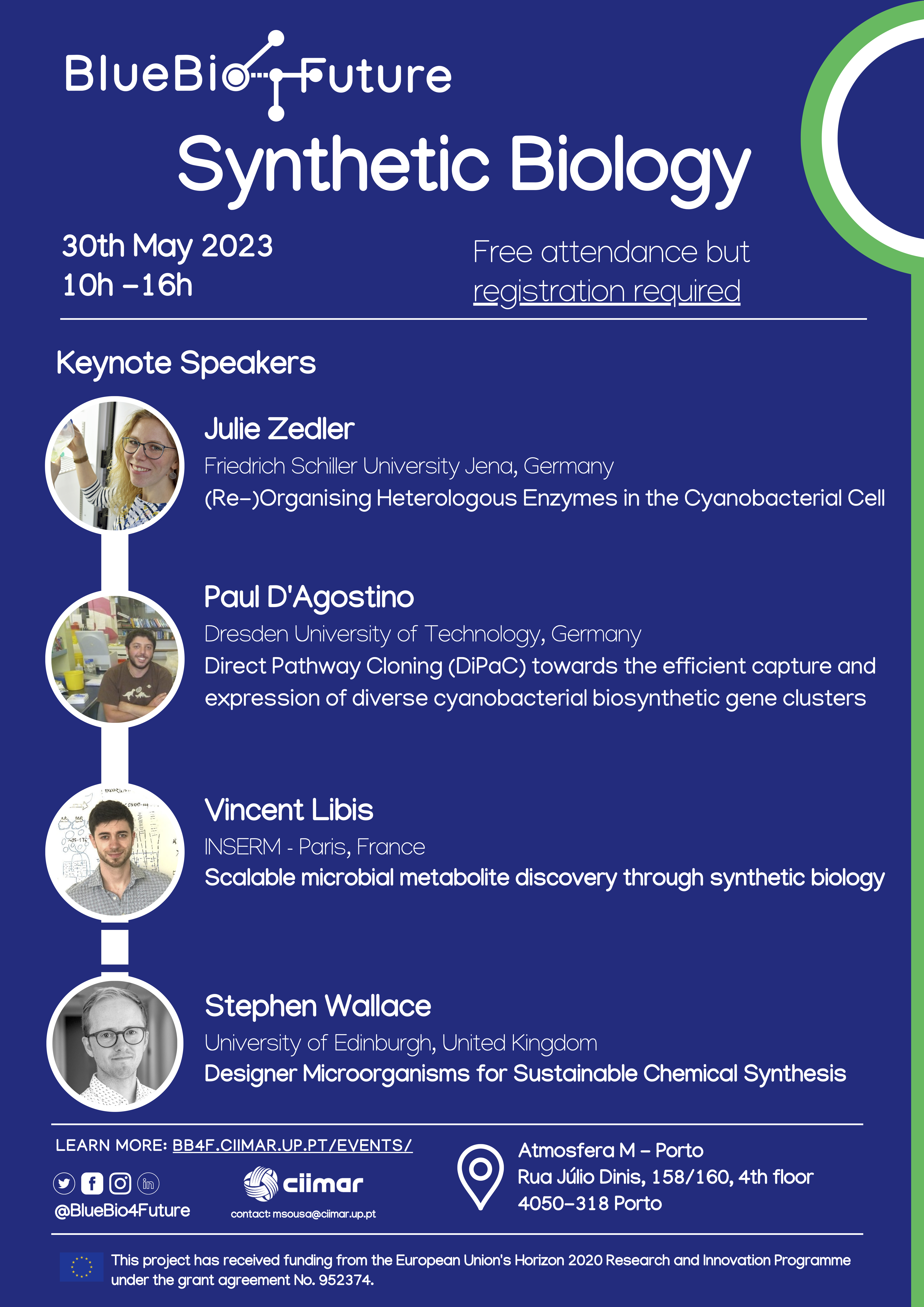BlueBio4Future Training Courses – Keynote speakers Lectures
30th May 2023 |
Atmosfera M – Porto
Rua Júlio Dinis, 158/160, 4th floor
4050-318 Porto
Four recognized synthetic biology researchers are participating in the Short Course in Synthetic Biology, part of the BlueBio4Future ERA Chair project. They will share their most recent findings with the Short Course attendees and the CIIMAR research community.
We hereby present the opportunity for those who were unable to take the entire three-day course to attend lectures by Stephen Wallace, Paul D’Agostino, Vincent Libis, and Julie Zedler:
(Re-)Organising Heterologous Enzymes in the Cyanobacterial Cell
Julie Zedler – Friedrich Schiller University Jena, Germany
Cyanobacteria have attracted attention for the development of sustainable industrial processes owed to their genetic tractability and fast phototrophic growth utilising sunlight as a “free” source of energy. Over the years, the engineering of cyanobacteria has advanced substantially and their metabolic capacity as cell factories has been demonstrated by a large array of different products reported in the literature. Producing a target compound often requires engineering of multi-enzyme, heterologous metabolic pathways. However, achieving efficient metabolic channeling and the spatial organisation of heterologous enzymes is challenging. This is partly due to the complex cyanobacterial ultrastructure and subcellular compartmentalisation. Prokaryotic protein translocation mechanisms are conserved but fundamental questions (e.g. composition and membrane localisation of translocation pores) remain unanswered in cyanobacteria.
Here, different strategies of targeting heterologous enzymes to native, subcellular localizations as well as secretion (out of the cell) will be presented. Furthermore, the application of Synthetic Biology concepts to unlock new-to-nature compartmentalisation and scaffolding strategies will be discussed. (Re-)organising enzymes in the cellular context can substantially improve the metabolic flux towards a product of interest and, thus, advance cyanobacterial biotechnology.
Direct Pathway Cloning (DiPaC) towards the efficient capture and expression of diverse cyanobacterial biosynthetic gene clusters
Paul D’Agostino – Dresden University of Technology, Germany
Microbial natural products are a vital source of inspiration for drug development. Therefore, the discovery of novel and bioactive natural products is essential to combat emerging new pathogens and to counteract the exacerbating crisis of microbial resistance. While cyanobacteria have proven to be an excellent source of structurally intriguing and bioactive natural products, several factors impede the efficient discovery and exploitation of these molecules including slow growth rates, challenging or ineffective genetic manipulation techniques and low molecule titres. To overcome these difficulties and speed-up discovery rates, we recently developed a synthetic biology cloning strategy termed Direct Pathway Cloning (DiPaC) for the capture and heterologous expression of small- to mid-sized cyanobacterial gene clusters. DiPaC utilises long-range PCR and in vitro DNA assembly to facilitate pathway assembly, cluster refactoring and direct transfer into any vector backbone in vitro.
In the first part of my talk, I will describe our application of DiPaC towards the experimental validation of the cyanobacterin biosynthetic gene cluster. In the second part of my talk, I will describe how we further exploited our knowledge gained of cyanobacterin biosynthesis for further discovery, including discovery of cryptic pathways and combinatorial (bio-)synthesis to generate novel structures.
Due to its simplicity, we envisage DiPaC to become an essential method for biosynthetic gene cluster capture and metabolic pathway construction with significant applications for the functional characterisation of novel natural product pathways well into the future.
Scalable microbial metabolite discovery through synthetic biology
Vincent Libis – INSERM – Paris, France
Discovery of bioactive secondary metabolites of microbial origin have declined in the past decades, depriving clinical pipelines from a key source of novel lead molecules. Encouragingly, the natural repertoire of microbial secondary metabolites remains vastly underexplored, and recent developments in microbial genome mining technologies offer ways to accelerate the pace of discoveries. Sequencing and bioinformatics allow prioritization of biosynthetic genes predicted to encode new metabolites, and cloning and heterologous expression of such genes can speed up the discovery of therapeutically relevant molecules. Here, an approach allowing to massively parallelize these processes will be presented. The streamlined interrogation of a large number of biosynthetic genes contained in a strain collection led us to discover several previously uncharacterized natural products, including a novel antibiotic. I will discuss the importance of leveraging economies of scale with cloning strategies and their potential to become a major source of novel leads. On the side, I will present how citizens can be involved on specific bottlenecks and take part in the global effort to find novel molecules, in particular urgently needed novel antibiotics.
Designer Microorganisms for Sustainable Chemical Synthesis
Stephen Wallace – University of Edinburgh, United Kingdom
Reducing the carbon emissions of the modern chemical industry is one of the most pressing challenges facing modern research in biotechnology. Here, engineered microorganisms have emerged as an elegant solution, where de novo biosynthetic pathways can be designed to convert a range of renewable feedstocks into industrial small molecules via fermentation.
In my talk, I will discuss some of our most recent work in this area focussed on the use of PET plastic ‘waste’ as a new carbon feedstock for microbial biosynthesis. This approach simultaneously creates sustainable routes to industrial petrochemicals whilst also addressing the plastic waste crisis. I will also introduce some of our unpublished work in the field of biocompatible chemistry – the use of non-enzymatic catalysis and microbial metabolism simultaneously to create new-to-nature products. Here, I will outline how we have interfaced engineered metabolism and biocompatible Pd catalysis at the cell membrane to enable the bio-production of industrial products that cannot be accessed via synthetic biology alone.
Together, these studies will showcase how synthetic biology can be applied to enable the bioconversion of plastic waste into industrial chemicals that are currently manufactured from fossil fuels, and how synthetic biology can be merged with synthetic chemistry to enable the use of abiotic chemistry in living cells.
Julie Zedler completed her PhD in the Colin Robinson Lab at the University of Kent in the United Kingdom. There, she investigated the potential of microalgae as a cutting-edge platform for the development of recombinant proteins and high-value compounds and engineered a different route for more effective carbon fixation in model cyanobacterial systems. Julie’s study focuses on developing molecular engineering tools to increase the yields of microbial products.
She currently holds a junior professor position at Friedrich Schiller University Jena (tenure track).
Paul D’Agostino obtained his PhD from the Western Sydney University (formally University of Western Sydney) in 2014 which focused on comparative genomics and proteomics of saxitoxin-producing cyanobacteria. After completing his PhD he had postdoctoral positions first at the University of New South Wales (Australia) followed by the Technische Universität München. At the moment, Paul is at the Technische Universität Dresden where he has started to develop his independent research on the discovery of natural products using genome mining, direct pathway cloning, and heterologous expression of cryptic pathways with a focus on symbiotic cyanobacteria.
Stephen Wallace completed his PhD in Organic Chemistry at the University of Oxford’s (University College), where he worked on the total synthesis of Gephyrotoxin family of compounds.He moved to Cambridge in 2012 to begin a Career Development Fellowship in Professor Jason Chin’s lab at the MRC Laboratory of Molecular Biology. He developed several strain-promoted Diels-Alder click reactions for the site-specific labeling of proteins in E. coli using AMBER stop-codon suppression. Stephen then moved to Harvard University’s Department of Chemistry and Chemical Biology in 2014, where he worked in Prof. Emily Balskus’ lab. He created abiotic, non-enzymatic processes to be used with metabolically modified bacteria. In 2017, Stephen accepted a position as a Lecturer in Biotechnology at the University of Edinburgh. There, he has been conducting independent research at the intersection of synthetic chemistry and synthetic biology. He was assigned in 2019 to the California Institute of Technology’s Department of Chemical Engineering, where he collaborated with Prof. Frances Arnold on the directed evolution of enzymes. Stephen received a UKRI Future Leaders Fellowship in 2020 to support his work on the sustainable synthesis of industrial chemicals using a combination of chemical catalysts and engineered microorganisms.
Vincent Libis obtained his PhD at the Institute of Systems and Synthetic Biology – CNRS Institute on the subject of “New inputs for synthetic biological systems” while working with the BioRetroSynth research team. After completing his doctorate, he worked as a postdoctoral researcher at Rockefeller University, developing scalable methods for the discovery of biologically active compounds with Prof. Sean Brady, at the Laboratory of Genetically Encoded Small Molecule. One of his most notable findings was related with the exploring and exploitation of the biosynthetic potential of rare metagenomic DNA using network analysis of targeted sequences.
He just became the leader of the research group at INSERM in Paris, France, where he is focusing on the development of synthetic biology techniques for the identification of bioactive compounds.



